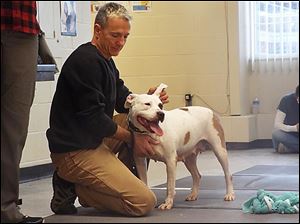
2 of 6 seized ‘pit bulls’ killed because of behavior concerns
1/7/2014
Donna Reynolds and Tim Racer, founders of BADRAP in California, played with ‘pit bull’ Michaela last month during a visit to Lucas County Canine Care & Control in Toledo to evaluate six ‘pit bulls.’
THE BLADE/LORI KING
Buy This Image

Donna Reynolds and Tim Racer, founders of BADRAP in California, played with ‘pit bull’ Michaela last month during a visit to Lucas County Canine Care & Control in Toledo to evaluate six ‘pit bulls.’
Two of six “pit bulls” seized nearly a year ago in a Toledo dog-fighting case have been killed under orders from Julie Lyle, director of Lucas County Canine Care & Control, with another one transferred recently to a rescue group for rehabilitation.
All six dogs had been evaluated Dec. 21 by experts Donna Reynolds and Tim Racer, the co-founders of BADRAP, a California “pit bull” rescue, education, and advocacy group established in 1999.
The group is a nationally recognized resource for dog owners and shelters and helped evaluate and rehabilitate the dozens of “pit bulls” rescued from NFL player Michael Vick's Bad Newz Kennels dog-fighting operation in 2007.
The BADRAP representatives did not recommend that the dogs be killed. Ms. Reynolds said in an email to The Blade that of the group of dogs, the two that were killed had “sustained the most damage from their abuse.”
“We recommended that they only be placed in settings where they would receive very tight management around other dogs and specialized training with caretaker/trainers who had previous experience with meeting their special needs,” she said. “These resources can be difficult to find, so we do understand and empathize with [Ms. Lyle’s] difficult decision.”
Jean Keating, executive director of the Lucas County Pit Crew that brought the BADRAP representatives to Toledo and usually a vocal proponent of “pit-bull” rehabilitation, declined to provide her opinion on the two deaths.
“It's always a matter of resources when you're looking at the placement of dogs,” she said. “It's a constant balancing act. It depends on what is available to you and that's the reality of it. [Ms. Lyle's] job is ultimately about public safety and it's her call. I appreciate the fact that we were allowed to bring in Tim and Donna and see what might be possible for these dogs.”

Tim Racer of BADRAP plays with Mopsy during a visit to perform evaluations of the ‘Fearing Six.’
Lucas County Canine Care & Control has housed the Toledo dogs since they were seized on Jan. 31. City police responding to a report of a suspicious person discovered the dogs caged and chained to the floor in an otherwise vacant, boarded-up house in the 200 block of South Fearing Boulevard.
Their former owner, Carl Steward of 716 Cherry St., was convicted Oct. 23 of five felony counts of dog fighting. He was acquitted on one count relating to a young female “pit bull” that had no fighting scars and had not been bred.
Steward was sentenced in November to six months in jail, six months at a correctional treatment facility, ordered to pay $12,030 for the care of the dogs, and banned from owning another dog, among other requirements.
Sometimes called the “Fearing Six,” the dogs were the first ex-fighters in Lucas County's history to be given a second chance. Until 2012, “pit bulls” were deemed inherently vicious under Ohio law and were subsequently killed without any opportunity for evaluation or rehabilitation. Tom Skeldon, Ms. Lyle’s predecessor who was ousted from his job in 2009, was known to be hostile toward “pit bull”-type dogs.
Mr. Skeldon, a cousin to Lucas County Commissioner Tina Skeldon Wozniak, had lobbied before the Ohio Legislature to maintain “pit bulls” as vicious, even if they were puppies. He had killed thousands of “pit bull” mixed breeds, including newly born puppies — deciding on his own whether a dog was a “pit bull” and should live or die.
The only male of the Fearing group, a tan and white dog named Bear, was killed Dec. 26. According to his BADRAP evaluation, he “showed little bite inhibition during restraint and intense arousal around other dogs.” He was “willing to punch [the] handler with [his] muzzle” and was “very mouthy.”
Ms. Lyle said Bear's large size and powerful build required someone who could physically handle such a strong dog. Considering that fact in addition to his intolerance of handling by humans and his serious dog aggression meant he posed a significant risk, Ms. Lyle said.
“That's a very dangerous combination,” she said. “We're a public-safety agency and we can't place dogs that could be a danger to the community.”
Any organizations that may have been interested in taking over Bear's rehabilitation would have needed to be extremely knowledgeable and experienced with such dogs.
“If BADRAP could take him, I would say that would have been fine,” Ms. Lyle said. “He needed much more than most organizations can handle.”
A tan female named Eleanor was killed Dec. 29. Her evaluation showed she had an “intense interest” in other dogs, could not be distracted from them, and attempted to “climb on [the] back of [the] dog” when greeting. While she was described as very friendly with people, she showed a ‘hard-wired’ prey interest in other dogs.”
Ms. Lyle decided Eleanor was too severely dog-aggressive to be transferred.
“When we are working hard to find placement for other dogs that have less-severe dog aggression and we haven't been successful, we aren't going to keep [Bear and Eleanor] in the kennel for another year and hope that a rescue steps up,” she said.

‘Honeysuckle’ — now named ‘Joy’ — waited in the lobby of Lucas County Canine Care & Control as she prepared to leave with her new foster family with Lucas County Pit Crew.
Honeysuckle, a tan and white female, recently went to a foster home with the Pit Crew and has been renamed Joy. Her evaluation noted she “welcomes handling and stays loose” and demonstrated playful behavior with other dogs.
“I just fell in love with her,” Ms. Keating said. “She seemed extremely attentive to people. She was very interested in the other dogs when they came in, but not in an aggressive way."
Because Joy has likely never been in a homelike environment, she will need extensive training and additional socialization.
Ms. Lyle said a handful of other rescue groups, including one from Chicago and one from Rochester, N.Y., have expressed an initial interest in rehabilitating a dog. But so far, none beyond the Pit Crew has taken the next step.
“It's the holidays, so we're not too stressed out about it yet,” Ms. Lyle said recently. “There's probably no one else local that could take one of these dogs.”
The three remaining dogs are Butterball, a young tan and black female that did not appear to have been fought, Mopsy, a white and orange female, and Michaela, a black and white female.
Butterball breezed through her evaluation. BADRAP commented that she is a “social, connected, solicitous girl with excitable, puppyish behavior. Nice dog.” She tolerates handling by humans and engages with people. She is dog-friendly and can be distracted from other dogs for focus work.
Mopsy did well in all of her handling tests, but showed concerning behaviors with other dogs like “excitable sniffing” and “mouth chattering,” so she will need close management around other canines.
She was able to be distracted from other dogs and actually ignored them during focus work. BADRAP noted Mopsy seemed to enjoy obedience work, responding immediately to a “sit” command, and was “calm, connected, affectionate.”
“Mopsy showed us that she likely had a loving home before she fell into the hands of her abuser,” Ms. Reynolds said. “She was thrilled to show us that she understood basic obedience commands and seemed to light up and say, 'Thank you!' when we asked for a ‘Sit.’ We were all choked up when she did that. How long has she been waiting for that connection again?”
Michaela also did well in her handling tests. While she “targets,” and “rushes” to other dogs, she could be distracted and refocused on training work. She was called a “likable girl, appropriately submissive, eager to connect with handlers,” though like Mopsy, she will also need careful management around other dogs.
Mopsy and Michaela “come with more challenges than Honeysuckle [Joy] and Butterball because they’ve each had some bad experiences with dogs, so need a well-orchestrated game plan for their recovery, including some decompression time, then slow and measured [introductions] with calm, well-socialized dogs as they learn to trust again,” Ms. Reynolds said. “They were our favorite dogs, by the way. If we had room in our program, one or both girls would be on a plane to [California.]”
Ms. Lyle said the dogs are holding up well in the shelter, so she is willing to keep them for awhile to see whether rescues step up to take them. There's no deadline, but euthanasia could still be possible.
“I won't say it's off the table, but there's no plans to euthanize them at this point,” Ms. Lyle said. “They've stuck it out this long, so they'll be OK for a while longer.”
Ms. Keating said the Pit Crew may decide to take on one more of the “Fearing Six.”
“I'd like to see some other groups step up,” she said. “It's easier if a variety of groups each take one because of the resources it requires. If push comes to shove, we'll talk about taking another one.”
Joy will be given every opportunity to thrive and will be kept by the Pit Crew as long as needed until she finds a permanent adoptive home.
“She deserves to be given that chance,” Ms. Keating said.
Contact Alexandra Mester at: amester@theblade.com, 419-724-6066, or on Twitter @AlexMesterBlade.